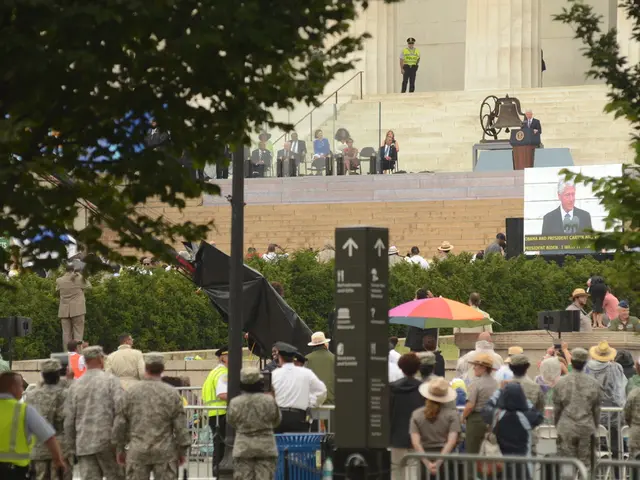Saudi-Pakistan Defense Agreement Discussion - Potential Incorporation of Nuclear Deterrent Policy?
In a significant move bolstering their longstanding relationship, nuclear-armed Pakistan and Saudi Arabia signed a Strategic Mutual Defense Agreement on Wednesday. The pact, signed during Pakistan's Prime Minister Shehbaz Sharif's official visit to Saudi Arabia, aims to strengthen defense cooperation and military ties between the two countries.
The agreement, according to a senior Saudi official, encompasses all military means, serving as a comprehensive defensive pact. It pledges that an attack on either Pakistan or Saudi Arabia would be treated as an act of aggression against both countries, marking a commitment towards joint deterrence to maintain peace and security in the region and the world.
The strategic pact, however, does not explicitly mention anything about nuclear deterrence or arsenals. The exact mechanics and details of the pact, such as how readiness or deployment will be handled, or what triggers the mutual defense in case either of the countries comes under attack, have not been laid out as of now.
The agreement is a response to the longstanding relations between Pakistan and Saudi Arabia, and not a response to any specific event. It is set against the backdrop of a historic partnership extending for nearly eight decades, and the timing of the pact is crucial as both countries grapple with security challenges.
Pakistan has emerged as a new power in the Middle East, demonstrating its military prowess and defense capabilities following its 11-day war with archrival India. Despite its military success, Pakistan faces its own set of economic challenges.
The development comes after Israel's overt attack on Hamas leaders in Qatar, raising questions about the reliability of the U.S. for security, according to the text of the agreement. The pact calls for a 'joint deterrence' to maintain peace and security in the region and the world.
Riyadh has been Islamabad's steadfast ally, sharing a history of close defense and security cooperation. This pact marks a significant milestone in the friendship between Pakistan and Saudi Arabia, further solidifying their strategic partnership.
However, it is important to note that there are no publicly available detailed provisions in the Strategic Defense Committee Agreement between Pakistan and Saudi Arabia specifically regulating nuclear deterrence or arms stockpiles, and the extent of any such arrangements is not disclosed in open sources. Neither Pakistan nor Saudi Arabia has highlighted deterrence as a core component of the agreement.
Read also:
- United States tariffs pose a threat to India, necessitating the recruitment of adept negotiators or strategists, similar to those who had influenced Trump's decisions.
- Weekly happenings in the German Federal Parliament (Bundestag)
- Southwest region's most popular posts, accompanied by an inquiry:
- Discussion between Putin and Trump in Alaska could potentially overshadow Ukraine's concerns







